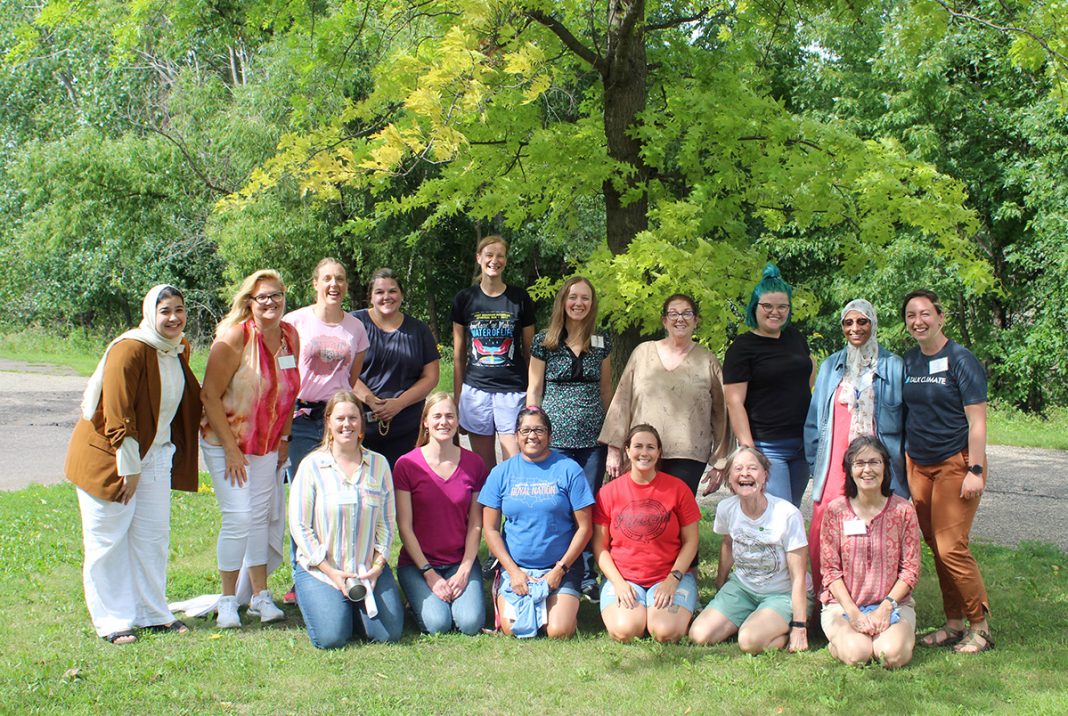We know people are doing amazing work to bring climate change education to their communities, and we want to create a space to co-learn, build skills, and deepen practices that increase climate action. Climate Generation, along with the Midwest Climate Collaborative at Washington University in St. Louis and the Science Education Resources Centre at Carleton College, will bring together educators from K-12 schools and districts, non-formal learning institutions, higher education, and government agencies to continue the movement of climate change education in a community of learning and practice. We invite you to learn more about the Midwest Climate Collaborative’s Educator Community of Practice and consider joining us this year.
Midwesterners are leading the movement on climate change education, and we are here for it!
In recent years we have seen an unprecedented climate change movement in the Midwest education sector. The Governor of Illinois just signed a bill that youth from It’s Our Future worked hard to pass. It’s Our Future and their partners are continuing to work for more comprehensive, cross-curricular climate education at all grade levels, including an Illinois Hub with Subject to Climate. The Wisconsin Initiative on Climate Change Impacts, a statewide collaboration of scientists and stakeholders, formed a partnership between UW-Madison’s Nelson Institute for Environmental Studies and the Wisconsin Department of Natural Resources to develop a Hub for teachers to find resources and to connect to one another. Advocacy work around Climate Justice Education is also being led in Minnesota. Schools in St. Paul, MN have adopted climate change curricula in their lesson plans. The Youth Environmental Activists (YEA!) Network is advocating for that to be expanded statewide using their Climate Justice Education bill. The bill is still being advocated for at the state legislature and we are excited to see how far it can go in 2025!
States in the Midwest have been gathering legislative support to integrate climate change education into their schools and districts for years, as shown in this K-12 State Policy Landscape Map collated by EcoRise. Many midwestern states have climate change in their science and social studies standards, have Career and Technical Education programs that support green careers, and are creating sustainability plans to guide their facilities and transportation systems. However, this work is still a patchwork of policies across most states. NAAEE’s Mapping the Landscape of K12 Climate Change Education Policy in the United States found climate change was included in education policies in three domains: teaching and learning, facilities and operations, and institutional governance, but most states only had policies in one of these domains. Minnesota was the exception with climate policies showing up in all three domains.
To address these challenges, the Midwest has many entities that build capacity for communities to address climate change, but who are they and where can they convene? According to an NAAEE Report, The State of Climate Change Education, teachers and administrators say state governments, school and district administrators, and parents are the most influential people to effect climate action. We also know that community-based organizations, higher education institutions, and other professional development providers are essential for connecting people to the resources and support they need. The Midwest Climate Collaborative at Washington University in St. Louis, and the Science Education Resources Centre at Carleton College launched the Midwest Climate Collaborative in 2022 to develop a coherent Midwestern response to the climate crisis, bringing together people from all sectors to collaborate for stronger climate literacy and climate change education in our region.
You’re invited to join the Midwest Climate Collaborative’s Educator Community of Practice.
The launch of the Midwest Climate Collaborative accelerated climate action in the education system through networking, knowledge generation, and leader development. To support the collaborative, a series of virtual programs invited educators from K-12, higher education, and community-based organizations to convene in a collaborative, learning-centered space. The sessions provided opportunities for networking and learning about climate education in a variety of settings around the Midwest and reached over 200 members. You can see a list of past events on the project’s webpage.
This year, we have put together a series of opportunities for you that revolve around 4 key themes related to current events and climate change education. There will be a workshop and a working group meeting for each theme with some asynchronous engagement opportunities in between. We encourage you to sign up for all the events within a theme to get the full experience. We will gather and integrate attendee feedback to plan activities at these events. Check out the events list below.
Educators that attend these events can expect to expand their knowledge on climate change impacts and solutions in their region, uncover the hidden power of the educator sector in addressing climate change, and connect with and hear inspiring stories from leaders effecting change. Participants in the working groups will be encouraged to apply what they are learning and to discuss outcomes with the group.
Events
Sep. – Oct. 2024, Understanding and Observing Climate Change
Nov. – Dec. 2024, Levers for Change, third Wednesday of the month
Jan. – Feb. 2024, Building Connection, third Wednesday of the month
Mar. – Apr. 2024, Educators as Change Makers and Champions, third Wednesday of the month
We will conclude with an in-person gathering at the 2025 Midwest Climate Summit for a chance to connect with educators across the midwest. This summit will be held April 30 – May 2nd 2025 in Madison, WI.
We hope to see you at some of these events. Please sign up for the Community of Practice here to get invitations to events and to participate in our online portal.


